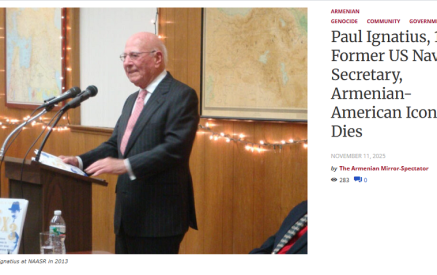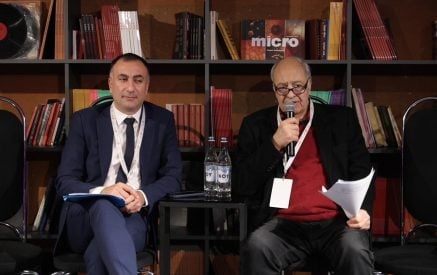Much has been said in the past few weeks about the impending closure of the Diaspora Ministry—among others—proposed by Acting Prime Minister Nikol Pashinyan as part of an effort to streamline government operations.
The unilateral decision to dissolve the ministry and fold its mission into other government institutions, without consulting with entities in the Diaspora is shortsighted and misguided at best. Perhaps such a discourse would yield the same conclusion. But without it, we will never know.
On the other hand, proclamations by political parties, groups and some Diaspora communities opposing this move by simply emphasizing the strategic importance of the Diaspora to the homeland, and not venturing beyond rhetoric to propose new mechanisms that can further Homeland-Diaspora relations is also unproductive.
Let’s agree that since its inception in 2008, the Diaspora Ministry not only has been ineffective, but also a failure all because its mission was never clearly outlined. The ministry, with its omnipresent minister, became the distributor of medals and honors to various Diaspora organizations and individuals and the organizer of several programs that were always touted as successes despite a lack of metrics and evaluations. Most of the accolades that were showered by the ministry were paid for by the recipient individuals or organizations.
This writer and this newspaper have consistently criticized the activities of the ministry, due, for the most part, to the minister’s declarations and actions, which not only have not served to advance Homeland-Diaspora relations, but have also, in some cases, deterred Diasporans from engaging with the ministry.
The core of the issue lies in the fact that neither those who decreed the creation of the ministry, nor the ministers who were running it completely understood what a diaspora really is and treated the ministry as an entity that organized behemoth events, such as the four Armenia-Diaspora conference and the biennial gatherings of press representatives, none of which provided a forum to address the gist of the Diaspora-Armenia relations. Instead all of the aforementioned events became shows (if not a circus) where the Diaspora Minister would not only dictate the terms of discussion, but would also direct the participants to applaud—or not—statements and actions. These Soviet-style pep rallies served as benchmarks for the ministry’s existence and the perpetuation of a bureaucracy at the expense of the taxpayer.
A diaspora is a scattered population, whose origin lies in a separate geographic locale, resulting from involuntary mass dispersions of a population from its indigenous territories. As such, a diaspora is a political entity. Thus, a ministry that is tasked with addressing issues related to a diaspora, must also operate in a manner that encompasses the political narrative that comes with the reality of dispersion.
From the onset, the Diaspora Ministry never took time to research the experiences of other nations with large diasporas (Israel, Ireland and Italy come to mind) and to adapt or adopt some of those experiences that have had a positive impact in buttressing diaspora communities for the enhancement and strengthening of the homeland.
Instead, it relied on the Diaspora Armenians inherent affinity toward the homeland, without understanding the genesis of that “love for country above all else” sentiment. For example, an astute Diaspora minister would never tell Armenians who did not speak Armenian that they weren’t true Armenians. Nor, for that matter, a Diaspora minister would profess that those without an “ian” or a “yan” at the end of their last names were not actual Armenians.
After last spring’s popular movement toppled the regime, a new Diaspora Minister was appointed. In July, during a luncheon welcoming him to Los Angeles, I asked the minister whether there were efforts to teach Diaspora history in Armenian schools, basing my inquiry on the notion that the lay—or a new generation—Armenian might not possess the knowledge of what exactly is a diaspora. The minister’s response was no. But that could be a good start—educating people in Armenia about the Diaspora and the struggles to remain Armenian in foreign lands where they sought refuge. Similarly, such education in the Diasporan communities, could embolden Diasporan Armenians to find their unique role, that is not always tied to financial contributions, in the advancement of the homeland.
In dealing with the post-regime change diaspora ministry, it was encouraging to hear that part of the plans the ministry had was to study other diasporic experiences and to apply the necessary elements to the work of the ministry. This approach could be done with or without a ministry, but it is a step that could yield better results.
At the same time, the Diaspora Ministry is definitely not the entity that is to organize the Diaspora, as has been whispered in some circles. A government entity that does not know or possibly fully grasp the nuances of each community, cannot, in reality, be tasked with organizing it. It can, however, serve as an asset to advance the aspirations of each community.
The announcement about the dissolution of the Diaspora Ministry has also emboldened certain individuals who have aspirations of leading Diasporan structures to renew old debates about establishing a Diasporan “government” to lead the Diaspora. It should be clear that the closure of the Diaspora Ministry is not creating a vacuum for new people to fill, but rather it has brought about an opportunity to succinctly address the multi-layered aspects in order to optimize Homeland-Diaspora relation.
While closing ministries to streamline the government might be a good solution, the new government must consider the human toll of displacing hundreds if not thousands of employees who—rightly or wrongly—have been working in these structures. Before guaranteeing their alternate employment, the mass closure of the ministry could wreak havoc on the society. One simply needs to look at the consequences the closure of the federal government has had on the lives of Americans in the past several weeks.
The fate of the Diaspora Ministry, or the broader issue of Homeland-Diaspora relations, must be decided collectively. Perhaps before taking any steps, the new government can hold consultations with the Diaspora organization, through its diplomatic missions, to gain a better understanding of how best to address this issue, at the center of which rest the more than 8 million Armenians living in the Diaspora.
























































